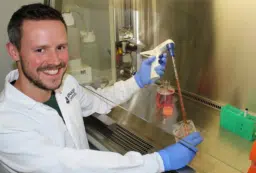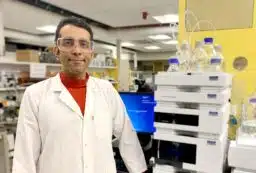A Melbourne scientist has discovered the gene that causes de Morsier syndrome, a severe disorder in which babies are born with underdeveloped brains, eyes and pituitary glands.
Dr. Paul Thomas from the Murdoch Childrens Research Institute has shown that children with this syndrome have a critical change in the Hesx1 gene which causes a malfunction during brain formation.
This discovery provides insight into the complex process of brain development that occurs in the foetus during the first three months of pregnancy. This research will also help in the development of therapies for patients with conditions such as Alzheimer’s and Parkinson’s disease in which brain cells degenerate over time.
“The cause of this de Morsier syndrome has been a mystery for many years.” Dr. Thomas said. “Hopefully, this discovery will help families of affected children to better understand the basis of this disorder.”
Dr Thomas will present his findings at ScienceNOW!, at the Exhibition Centre in Melbourne today (Friday).
The clue to linking Hesx1 and de Morsier syndrome came from mouse studies performed by Dr. Thomas and his colleagues at the National Institute for Medical Research in London.
“We demonstrated that the Hesx1 gene is essential for mice to be born with normal brains. Mice without this gene had similar features to those seen in children with de Morsier syndrome.”
Dr. Thomas then isolated the human version of the Hesx1 gene and identified Hesx1 mutations in children with this syndrome.
“Many genes involved in embryo development have the same function in mice and humans.” Dr. Thomas said. “This study highlights the benefit of using mouse genetic research to find the causes of human diseases.”
Dr. Thomas and his research team are now focussed on finding genes that interact with Hesx1 during mouse brain development. This may lead to the identification of other brain disorder genes.





 Fresh Science is on hold for 2022. We will be back in 2023.
Fresh Science is on hold for 2022. We will be back in 2023.